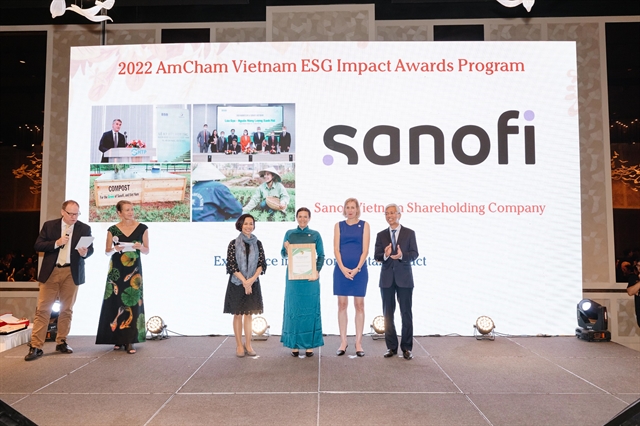Sanofi Vietnam has received recognition for “Excellence in Environmental Impact”, one category of the ESG Impact Awards given by the American Chamber of Commerce in Viet Nam (AmCham Vietnam).

Sanofi Vietnam has received recognition for “Excellence in Environmental Impact”, one category of the ESG Impact Awards given by the American Chamber of Commerce in Viet Nam (AmCham Vietnam).
The award is a recognition for Sanofi’s contributions to innovations for sustainable development.
The “Planet care” strategy focuses on three main goals, including reaching carbon neutrality in 2030, limiting the environmental footprint and adopting circular solutions, and improving the environmental profile of products.
This strategy is implemented through different activities in Viet Nam with many significant results such as reducing 16 tonnes of plastic waste per year, 500 tonnes of waste paper yearly, and 58 tonnes of PVC resin, aluminum foils and blister waste each year.
The ESG Impact Awards are divided into different categories such as environmental impact, social impact, community engagement and corporate social responsibility (CSR), corporate governance and ESG impact.
Fanny Haniquaut, head of Industrial Affairs of Sanofi Vietnam, said this award was not only a recognition of Sanofi’s environmental innovations, but also proof of its relentless efforts to construct a sustainable environment.
“With specific purposes, Sanofi will continue to develop effective ideas to diminish emissions, grow a green energy ecosystem, and implement a circular economy solution to make a positive impact on the socio-economy,” she said.
The Sanofi Vietnam factory is simultaneously working towards the goal of becoming carbon neutral in 2025.
To give impetus to water recycling, the company applies wastewater treatment in every working process and harvests rainwater in large containers to make use of it in other activities.
In addition, it has converted 50 per cent of direct marketing activities to online interactions to diminish the environmental impact, actively reduced sizes, weights, and consumptions of packaging materials and collaborated with pharmacy chains to implement pilot programmes of collecting used insulin pens and properly destroying them to minimise untreated medical waste, among many other projects.
“Rice is a new green”, a sustainable development project initiated by Sanofi Vietnam, is an idea pioneering the conversion of conventional diesel fuel-fired boilers to rice husk-fired boilers, aiming to reduce CO2 emissions by 2,300 tonnes per year.
This model is expected to motivate other industries in the country to find alternative solutions for diesel, which will contribute to a significant reduction of CO2 nationwide.
With the assistance from partners, the combustion technology of the project can also purify rice husk ash to generate high-end silica, which brings greater value addition and industrial applications. — VNS





